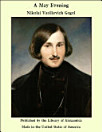Taras Bulba and Other Tales
set. del 2020 · Library of Alexandria
3,3star
3 ressenyesreport
Llibre electrònic
409
Pàgines
family_home
Apte
info
reportNo es verifiquen les puntuacions ni les ressenyes Més informació
Sobre aquest llibre
Russian literature, so full of enigmas, contains no greater creative mystery than Nikolai Vasil'evich Gogol (1809-1852), who has done for the Russian novel and Russian prose what Pushkin has done for Russian poetry. Before these two men came Russian literature can hardly have been said to exist. It was pompous and effete with pseudo-classicism; foreign influences were strong; in the speech of the upper circles there was an over-fondness for German, French, and English words. Between them the two friends, by force of their great genius, cleared away the debris which made for sterility and erected in their stead a new structure out of living Russian words. The spoken word, born of the people, gave soul and wing to literature; only by coming to earth, the native earth, was it enabled to soar. Coming up from Little Russia, the Ukraine, with Cossack blood in his veins, Gogol injected his own healthy virus into an effete body, blew his own virile spirit, the spirit of his race, into its nostrils, and gave the Russian novel its direction to this very day.
More than that. The nomad and romantic in him, troubled and restless with Ukrainian myth, legend, and song, impressed upon Russian literature, faced with the realities of modern life, a spirit titanic and in clash with its material, and produced in the mastery of this every-day material, commonly called sordid, a phantasmagoria intense with beauty. A clue to all Russian realism may be found in a Russian critic's observation about Gogol: "Seldom has nature created a man so romantic in bent, yet so masterly in portraying all that is unromantic in life." But this statement does not cover the whole ground, for it is easy to see in almost all of Gogol's work his "free Cossack soul" trying to break through the shell of sordid to-day like some ancient demon, essentially Dionysian. So that his works, true though they are to our life, are at once a reproach, a protest, and a challenge, ever calling for joy, ancient joy, that is no more with us. And they have all the joy and sadness of the Ukrainian songs he loved so much. Ukrainian was to Gogol "the language of the soul," and it was in Ukrainian songs rather than in old chronicles, of which he was not a little contemptuous, that he read the history of his people. Time and again, in his essays and in his letters to friends, he expresses his boundless joy in these songs: "O songs, you are my joy and my life! How I love you. What are the bloodless chronicles I pore over beside those clear, live chronicles! I cannot live without songs; they... reveal everything more and more clearly, oh, how clearly, gone-by life and gone-by men.... The songs of Little Russia are her everything, her poetry, her history, and her ancestral grave. He who has not penetrated them deeply knows nothing of the past of this blooming region of Russia."
More than that. The nomad and romantic in him, troubled and restless with Ukrainian myth, legend, and song, impressed upon Russian literature, faced with the realities of modern life, a spirit titanic and in clash with its material, and produced in the mastery of this every-day material, commonly called sordid, a phantasmagoria intense with beauty. A clue to all Russian realism may be found in a Russian critic's observation about Gogol: "Seldom has nature created a man so romantic in bent, yet so masterly in portraying all that is unromantic in life." But this statement does not cover the whole ground, for it is easy to see in almost all of Gogol's work his "free Cossack soul" trying to break through the shell of sordid to-day like some ancient demon, essentially Dionysian. So that his works, true though they are to our life, are at once a reproach, a protest, and a challenge, ever calling for joy, ancient joy, that is no more with us. And they have all the joy and sadness of the Ukrainian songs he loved so much. Ukrainian was to Gogol "the language of the soul," and it was in Ukrainian songs rather than in old chronicles, of which he was not a little contemptuous, that he read the history of his people. Time and again, in his essays and in his letters to friends, he expresses his boundless joy in these songs: "O songs, you are my joy and my life! How I love you. What are the bloodless chronicles I pore over beside those clear, live chronicles! I cannot live without songs; they... reveal everything more and more clearly, oh, how clearly, gone-by life and gone-by men.... The songs of Little Russia are her everything, her poetry, her history, and her ancestral grave. He who has not penetrated them deeply knows nothing of the past of this blooming region of Russia."
Puntuacions i ressenyes
3,3
3 ressenyes
Puntua aquest llibre electrònic
Dona'ns la teva opinió.
Informació de lectura
Telèfons intel·ligents i tauletes
Instal·la l'aplicació Google Play Llibres per a Android i per a iPad i iPhone. Aquesta aplicació se sincronitza automàticament amb el compte i et permet llegir llibres en línia o sense connexió a qualsevol lloc.
Ordinadors portàtils i ordinadors de taula
Pots escoltar els audiollibres que has comprat a Google Play amb el navegador web de l'ordinador.
Lectors de llibres electrònics i altres dispositius
Per llegir en dispositius de tinta electrònica, com ara lectors de llibres electrònics Kobo, hauràs de baixar un fitxer i transferir-lo al dispositiu. Segueix les instruccions detallades del Centre d'ajuda per transferir els fitxers a lectors de llibres electrònics compatibles.








